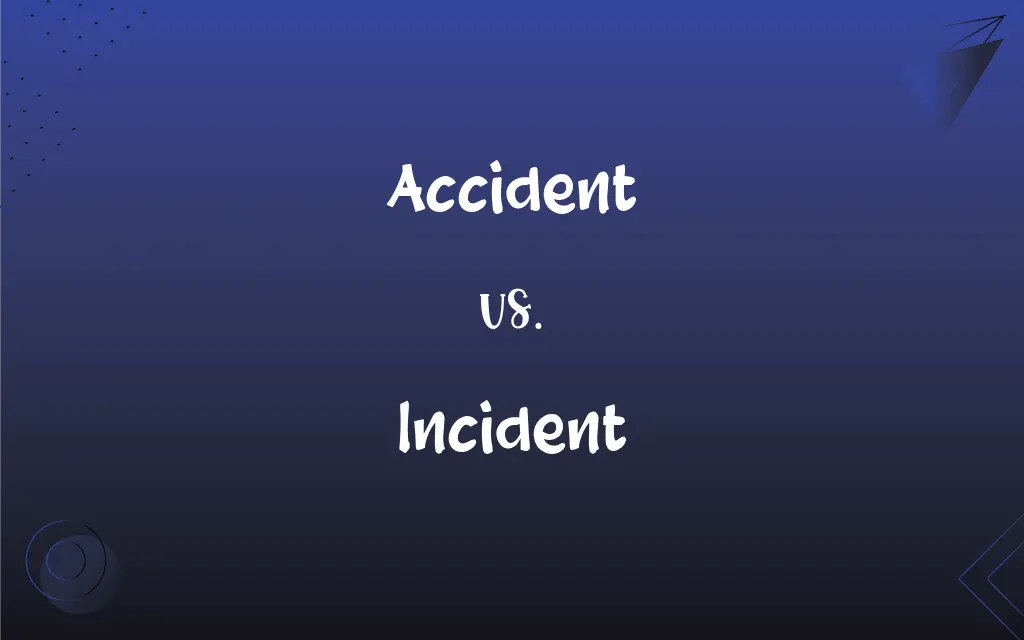Accident vs. Incident: What's the Difference?
Edited by Janet White || By Harlon Moss || Updated on October 5, 2023
An accident is an unexpected, unintentional event causing damage or injury, while an incident can be any event, unexpected or planned, which may or may not cause harm.

Key Differences
An accident is often conceptualized as an unplanned event that results in harm or loss. Incidents, however, can encompass all events that are not routine, not necessarily resulting in harm. Accidents always imply undesirability, whereas incidents don’t necessarily do so.
When considering the realm of safety and risk management, an accident is typically an incident that has resulted in injury or damage. On the contrary, an incident in this context might not result in injury or damage but has the potential to do so. Thus, all accidents can be incidents, but not all incidents are accidents.
Linguistically speaking, accident contains a notion of unintended and unexpected occurrences, while incident can portray a broader range of events, without necessitating the element of surprise or unintended outcome. An incident might be neutral or even positive, while an accident generally leans toward the negative.
Legally and in insurance terms, an accident might be subjected to different scrutiny compared to an incident. Accidents might have implications regarding fault and liability. Incidents, however, might involve a review of whether there was an intent or predictability, not necessarily pivoting on the outcome of harm or loss.
In terms of emotional and psychological perspectives, the word accident tends to evoke a stronger reaction due to its association with unintended harm or loss. An incident, meanwhile, might or might not trigger a significant emotional response, as it might refer to an event that is neutral, harmful, or beneficial.
ADVERTISEMENT
Comparison Chart
Intent
Unintentional
Can be intentional or unintentional
Outcome
Usually involves harm or loss
May or may not involve harm or loss
Usage in Safety Field
Implies injury or damage occurred
Can indicate a near-miss or no injury event
Legal/Insurance Connotation
Often involves considerations of liability
Might not inherently involve considerations of fault
Emotional Connotation
Generally viewed negatively
Can be neutral, negative, or positive
ADVERTISEMENT
Accident and Incident Definitions
Accident
An undesirable or unfortunate happening.
The vase broke in a regrettable accident.
Incident
An occurrence or event.
The incident at the store was quickly resolved.
Accident
An event occurring unexpectedly and causing damage.
The car accident caused a major traffic jam.
Incident
A specific instance or happening.
A minor incident disrupted the ceremony.
Accident
An incidental and unplanned event causing loss.
The camping trip was ruined by a weather accident.
Incident
An event that may be of concern.
The incident was recorded for quality purposes.
Accident
A mishap without apparent cause.
The papers flew everywhere in a random accident.
Incident
A situation that interrupts normal procedure.
The incident caused a delay in production.
Accident
An unforeseen event causing harm.
The spill on the floor caused an accident.
Incident
A particular occurrence or situation.
An incident in the game caused a brief pause.
Accident
An unexpected and undesirable event, especially one resulting in damage or harm
An accident on the assembly line.
Car accidents on icy roads.
Incident
A particular occurrence, especially one of minor importance.
Accident
An unforeseen event that is not the result of intention or has no apparent cause
A series of happy accidents led to his promotion.
Incident
An event in a narrative or drama.
Accident
An instance of involuntary urination or defecation.
Incident
A usually violent or disruptive occurrence, especially one that precipitates a larger crisis
An international incident that provoked war.
FAQs
Can an incident be a neutral event?
Yes, an "incident" can refer to any event, neutral, positive, or negative, without implying harm or loss.
Are all accidents incidents?
Yes, all accidents are incidents because they are events or occurrences, though they are usually undesirable.
Can an accident be intentional?
No, accidents are generally defined as events that are both unintended and unexpected.
Can you describe an incident that is not an accident?
Yes, a scheduled power outage could be described as an incident, but not an accident, since it’s planned and causes no harm.
In a work setting, how should an accident be reported as opposed to an incident?
Both should be reported promptly, but an accident report might require additional information about injuries or damages.
How are incidents categorized in safety and risk management?
Incidents can be categorized based on their impact, such as "near misses" or "adverse events," irrespective of harm caused.
Can accidents be prevented?
While some accidents can be mitigated or prevented with precautions, by definition, they are unexpected and unintended, so not all are preventable.
Is an incident always an unplanned event?
No, an "incident" can be either planned or unplanned and does not always imply surprise or unintended outcomes.
Does the severity of the event determine whether it’s called an accident or an incident?
Not necessarily. The distinction often lies in intentionality and planning, not severity.
Are incidents always recorded in an organizational setup?
Typically, yes. Incidents are recorded to analyze patterns, prevent future occurrences, and comply with regulatory requirements.
How does media typically differentiate between accident and incident?
Media may use "accident" to describe events with harm or damage and "incident" for a broader range of events, considering the nuance and implications of the words.
Can an accident be a minor event?
Yes, accidents can be minor, such as a small spill, as long as they are unintended and cause some level of disruption or harm.
Is human error a common element in accidents?
Yes, human error is often a contributing factor to accidents, as they involve unintended and unexpected outcomes often linked to oversight or miscalculation.
Does an accident always imply harm or loss?
Yes, typically "accident" suggests an unexpected event that causes harm or loss.
In medical terms, is a mishap considered an accident?
Often, yes. Medical mishaps that cause unintended harm are commonly referred to as accidents.
Is an accident always a disruptive event?
Generally, yes. Accidents are disruptive as they introduce unexpected and often undesirable outcomes.
Can an incident have a positive outcome?
Yes, incidents can have neutral or positive outcomes since they are simply events and do not inherently have negative connotations.
Is it possible for an incident to evolve into an accident?
Yes, if an incident (event) unexpectedly results in harm or damage, it might retrospectively be described as an accident.
Can both accident and incident be used interchangeably in legal terms?
Not always, as “accident” might have different liability implications compared to "incident" in legal and insurance contexts.
In traffic reports, how is an incident different from an accident?
An "accident" often refers to a collision or other event causing damage, while an "incident" might refer to any event affecting traffic, like a breakdown.
About Author
Written by
Harlon MossHarlon is a seasoned quality moderator and accomplished content writer for Difference Wiki. An alumnus of the prestigious University of California, he earned his degree in Computer Science. Leveraging his academic background, Harlon brings a meticulous and informed perspective to his work, ensuring content accuracy and excellence.
Edited by
Janet WhiteJanet White has been an esteemed writer and blogger for Difference Wiki. Holding a Master's degree in Science and Medical Journalism from the prestigious Boston University, she has consistently demonstrated her expertise and passion for her field. When she's not immersed in her work, Janet relishes her time exercising, delving into a good book, and cherishing moments with friends and family.































































